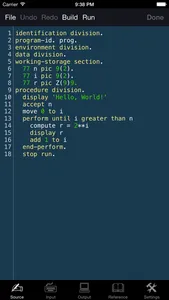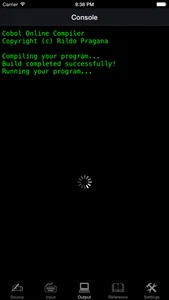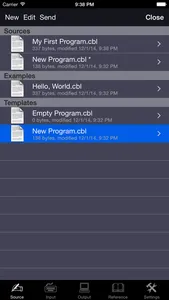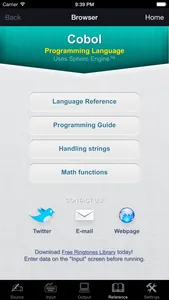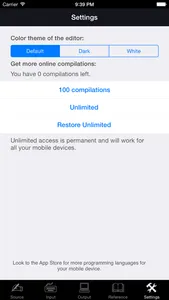The classic Cobol programming language for iPad, iPhone and iPod touch. Programming language is a perfect tool for studying, complex mathematical calculation, entertainment and many other useful tasks. The application is especially useful for learning the Cobol programming language. You have to buy compilations inside the application. Internet connection is required.
- The great programming tool on the AppStore.
- Your programming language for iOS is amazing!
* FEATURES *
- Compile and run your program.
- Text input before program run and text output.
- Enhanced source code editor with syntax highlighting, line numbers, color themes and additional keyboard.
- Online language reference and several program samples.
* LIMITATIONS *
- Internet connection is required to compile and run a program.
- Graphics, network, file system and real-time input are not supported.
- Maximum running time of a program is 15 seconds.
Thanks for using the application!
====================================
Cobol is one of the oldest programming languages. Its name is an acronym for COmmon Business-Oriented Language, defining its primary domain in business, finance, and administrative systems for companies and governments.
The Cobol specification was created by a committee of researchers from private industry, universities, and government during the second half of 1959. The specifications were to a great extent inspired by the FLOW-MATIC language invented by Grace Hopper - commonly referred to as "the mother of the Cobol language." The IBM COMTRAN language invented by Bob Bemer was also drawn upon, but the FACT language specification from Honeywell was not distributed to committee members until late in the process and had relatively little impact. FLOW-MATIC's status as the only language of the bunch to have actually been implemented made it particularly attractive to the committee.
The scene was set on April 8, 1959 at a meeting of computer manufacturers, users, and university people at the University of Pennsylvania Computing Center. The United States Department of Defense subsequently agreed to sponsor and oversee the next activities. A meeting chaired by Charles A. Phillips was held at the Pentagon on May 28 and 29 of 1959 (exactly one year after the Zürich ALGOL 58 meeting); there it was decided to set up three committees: short, intermediate and long range (the last one was never actually formed). It was the Short Range Committee, chaired by Joseph Wegstein of the US National Bureau of Standards, that during the following months created a description of the first version of Cobol. The committee was formed to recommend a short range approach to a common business language. The committee was made up of members representing six computer manufacturers and three government agencies.
The decision to use the name "Cobol" was made at a meeting of the committee held on 18 September 1959. The subcommittee completed the specifications for Cobol in December 1959. The first compilers for Cobol were subsequently implemented in 1960, and on December 6 and 7, essentially the same Cobol program ran on two different computer makes, an RCA computer and a Remington-Rand Univac computer, demonstrating that compatibility could be achieved.
- The great programming tool on the AppStore.
- Your programming language for iOS is amazing!
* FEATURES *
- Compile and run your program.
- Text input before program run and text output.
- Enhanced source code editor with syntax highlighting, line numbers, color themes and additional keyboard.
- Online language reference and several program samples.
* LIMITATIONS *
- Internet connection is required to compile and run a program.
- Graphics, network, file system and real-time input are not supported.
- Maximum running time of a program is 15 seconds.
Thanks for using the application!
====================================
Cobol is one of the oldest programming languages. Its name is an acronym for COmmon Business-Oriented Language, defining its primary domain in business, finance, and administrative systems for companies and governments.
The Cobol specification was created by a committee of researchers from private industry, universities, and government during the second half of 1959. The specifications were to a great extent inspired by the FLOW-MATIC language invented by Grace Hopper - commonly referred to as "the mother of the Cobol language." The IBM COMTRAN language invented by Bob Bemer was also drawn upon, but the FACT language specification from Honeywell was not distributed to committee members until late in the process and had relatively little impact. FLOW-MATIC's status as the only language of the bunch to have actually been implemented made it particularly attractive to the committee.
The scene was set on April 8, 1959 at a meeting of computer manufacturers, users, and university people at the University of Pennsylvania Computing Center. The United States Department of Defense subsequently agreed to sponsor and oversee the next activities. A meeting chaired by Charles A. Phillips was held at the Pentagon on May 28 and 29 of 1959 (exactly one year after the Zürich ALGOL 58 meeting); there it was decided to set up three committees: short, intermediate and long range (the last one was never actually formed). It was the Short Range Committee, chaired by Joseph Wegstein of the US National Bureau of Standards, that during the following months created a description of the first version of Cobol. The committee was formed to recommend a short range approach to a common business language. The committee was made up of members representing six computer manufacturers and three government agencies.
The decision to use the name "Cobol" was made at a meeting of the committee held on 18 September 1959. The subcommittee completed the specifications for Cobol in December 1959. The first compilers for Cobol were subsequently implemented in 1960, and on December 6 and 7, essentially the same Cobol program ran on two different computer makes, an RCA computer and a Remington-Rand Univac computer, demonstrating that compatibility could be achieved.
Show More
